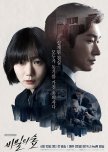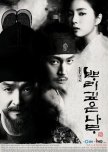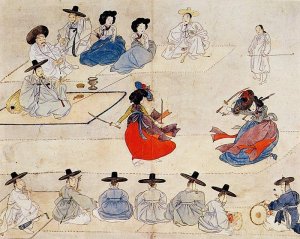
The plot lines may hardly be original, but the complexity of the main characters gives the old stories a freshness and power they would otherwise lack. Song Il Guk does a fine job as the young prince destined to found an empire, but my favorite actors (and characters) were Hu Joon Ho as the grizzled veteran Haemosu and Jun Kwang Ryul as the tormented king Kumwa. Hu exudes presence every moment he’s onscreen, and Jun’s portrayal of the king’s increasingly conflicted and destructive loyalties is devastating. The show also uses its length to draw us so completely into its web of relationships that many of its most powerful scenes are not the giant battles but the quiet moments where a truth is revealed or a lie is told or a heart is broken.
Does everything work? No. The plot meanders in the final third, with wild goose chases down narrative lines that seem designed to kill time rather than actually deliver meaningful revelations. I could have lived without the saccharine pop ballad love songs on endless repeat and you could get rip-roaring drunk in no time if you took a shot whenever someone stages an ambush, falls off a cliff, discusses an evil plan around an ornate wooden table or survives getting shot by multiple arrows. However, if you’re looking for ridiculously immersive popular entertainment and don’t mind sleep deprivation, you’re in for a hell of a ride. Just be careful – this whole drama thing can get addictive . . . .
Questa recensione ti è stata utile?

The writing is a bit sketchy in the initial episodes, with extra servings of trauma and some odd lapses in logic. However, the child actors are terrific (why hello, future stars!), and they morph into equally terrific adult actors. The male characters are particularly nuanced, as we watch two generations struggle to drag themselves and their country out of dire poverty. It isn’t always pretty, and I appreciated the show’s willingness to give all of its characters dark edges, especially since it’s equally willing to give them all moments of insight and grace. The female characters initially tend towards angelic but dim or shrewish and evil, but they also become more complex as the show progresses.
Keeping a 60 episode show engaging is no easy task, and Giant does it with sophistication, style and humanity. It has plenty of “big” moments, but it never forgets that even the most ordinary activities can be dramatic. It finds poetry in mud flats and rock piles, and in the rough-edged men fighting to build a nation from them at any cost.
Questa recensione ti è stata utile?

The show does drag out the denouement, with more moralizing speeches than I’d prefer. It’s also not a ringing endorsement of the idea that people can change. It is however, a lovely example of how good writing, acting and directing can bring an old genre to vibrant, urgent life.
Questa recensione ti è stata utile?

The Great King, Sejong
32 persone hanno trovato utile questa recensione
The first half of the show is particularly strong, in part due to outstanding performances by Kim Young Chul as Taejong and Choi Myung Gil as his embittered queen. Taejong may be monstrous, but he’s also powerfully human, and the show loses some of its spark when he exits the scene. The second half is weaker, perhaps because the series was cut down from 100 episodes to 86. This causes pacing issues, as some events are rushed through while drawn-out moments of pathos feel unearned due to a lack of dramatic set-up. Subplots get dropped and major characters disappear without acknowledgment or comment. It also means that Sejong comes off as far more serious than perhaps he was, as the show leaves out such “frivolous” elements of his life as his love of music and his passionate relationships with his concubines. In general, the show is more comfortable in the elegiac than the celebratory mode, but its tendency to emphasize loss sometimes deflects attention from just how extraordinary Sejong’s achievements were. It may be difficult to do great things, but there is great joy in such success as well.
Questa recensione ti è stata utile?

Coffee Prince is hardly an undiscovered gem, but like the best coffee shops, it’s a warm, inviting place to pass the time. It gently reminds that life’s small pleasures should be noticed and savored, and that choosing love, for a person, a profession, or a place, is worth whatever heartache or stigma may tag along.
Questa recensione ti è stata utile?

An Anti-Romance in the Best Possible Way
The Red Sleeve does something I never thought I’d see in a K-drama - it dares to suggest that love may not conquer all. Most “romantic” sageuks start with the premise that every commoner or court lady dreams of being swept off her feet by a handsome prince, but few look closely at the power dynamics of such relationships, especially in the Joseon era where the patriarchy was so rigid that even the most powerful woman in the kingdom, the Queen Dowager, was essentially under house arrest. To its credit, The Red Sleeve centers this fundamental inequality, suggesting that consenting relationships are impossible if one person is the master and the other, functionally, a slave. It’s also smart enough to feature one of Joseon’s “best” kings as its male lead, emphasizing that the issue is systemic, not individual, and that no ruler, no matter how just, upright and swoony can be an ideal partner as long as they view their love interest as a possession. And when a woman must obey, the line between rape and mutual affection quickly blurs, even if the man is doing it “for her own good.” The discomfort the show induces is magnified by the fact that it includes no easy villains. Everyone has an agenda, but everyone is also trying to do their best in a world where protocol and order take precedence over human feeling. But when human feelings must be excised in the name of duty, the drama reminds us that it’s often women who take the fall. It asks us to reconsider whose lives matter, and argues that agency, even the agency to choose heartbreak, may be preferable to even the dreamiest of suitors.Questa recensione ti è stata utile?

Unfortunately, I found the world surrounding the lovers to be less fleshed out and compelling. While I understand that the awfulness of most of the other major characters is meant to highlight just how terrible Hye Won’s life is despite its surface luxuries, I would have loved for there to have been more layers to the antagonists. Their universal loathsomeness did draw sympathy to the protagonists, but it also undermined the realism of the show and simplified its conflicts. It’s not hard to cheat on a husband with no redeeming characteristics, but that felt like an easy out for the screenwriter (and the audience) rather than an honest exploration of the challenges of marriage.
The directing of the show is carefully composed and the pacing slow. This allows for some lovely, unhurried emotional beats, but it can also feel a bit stifling. There were times I would have liked less precision and more abandon. The technique mirrors Hye Won’s fierce control, but when the fissures open in her life I wish the show had cracked open more deliriously as well. The main couple and the music are amazing. Everything else feels well worth losing for their stolen moments of joy.
Questa recensione ti è stata utile?

The Return of Iljimae
23 persone hanno trovato utile questa recensione
Intentionally structured like a storybook (complete with an initially over-intrusive narrator), the show jettisons many of k-drama’s structural clichés as it follows the growth of its protagonist from innocent young man to wiser hero. Jung Il Woo gives a lovely (in more ways than one) restrained performance full of moments of quiet sweetness and pathos. Jung Hye Young, as his mother, is also exceptional, radiating warmth and longing. There are plenty of fight scenes and large helpings of occasionally distracting slapstick comedy, but the show never loses its contemplative feel. The characters find fleeting moments of connection in sex, friendship, compassion, and sacrifice but the world’s injustices are always there, calling them away from comfort. The show suggests that heroism is not a natural gift, but something learned and struggled for and easily lost if the passion for justice tips over into hatred. There are occasional missteps, including a bizarre first episode, but once the show finds its rhythm, it becomes a hero’s journey very much worth the taking.
Questa recensione ti è stata utile?

The Painter of the Wind
27 persone hanno trovato utile questa recensione
However, while this is obviously a show about art, it is equally a show about sex. It uses its cross-dressing premise as a starting point to pose provocative questions about gender and sexuality, and unlike many other shows, it consistently refuses to default to safe, easy choices. It suggests that there is more than one way to read a painting or a relationship, and that societally sanctioned views that champion heterosexual male privilege will miss a great deal of meaning. Like Shin Yun Bok’s paintings, this is a daring, sexy show that is quite happy to reveal more about its world than its inhabitants may want to see.
Questa recensione ti è stata utile?

Tree With Deep Roots
28 persone hanno trovato utile questa recensione
“Tree” took a while to pull me in, but once the writers found their groove and the verbal fireworks began, it was riveting. Against the backdrop of a violent era, it asks if the brush can ever be mightier than the sword. If there is power in writing, and if so, who deserves to use it. If literacy is liberation or a different kind of slavery. Characters wield speech like blades in philosophical duels where systems of government and social orders hang in the balance. This is argument as blood sport – spectacular, visceral and deadly.
The cast tackles their paragraphs of text with gusto, and the director keeps the camera moving and the tension high. The final episodes falter a bit, veering away from ideas and more towards traditional action, with an ending that felt yanked from a summer blockbuster instead of developing organically from the drama's themes. Perhaps this was designed to appease nervous studio execs desperate to get to away from all the talking. It’s a small price to pay though for a show that is otherwise so smart, unconventional, and emotionally engaged as it teases out the limits and possibilities of language.
Questa recensione ti è stata utile?

The writing can be structurally erratic, but it’s always balanced and humane in its portrayal of both its heroes and its demons. This is a show driven by the “Heal Me” part of its title, emphasizing not vengeance for past wrongs, but reconciliation and re-integration for future happiness. Some plot threads are left hanging, but its exploration of how people are broken and put back together, medically implausible as it may be, is metaphorically lovely. It’s fiction, but it’s a show that knows that the stories we tell have the power to reshape our lives.
Questa recensione ti è stata utile?

Questa recensione ti è stata utile?

Questa recensione può contenere spoiler
Somewhere inside Goblin, buried under a mound of PPL and tears, is a good show trying to get out. The first two episodes suggest what might have been, deftly mixing intense action and off-beat humor in a dark world filled with ominous reapers, wounded goblins, ghost-seeing teenagers and cabbage-wielding grannies. The stage seems set for a life and death clash of epic proportions. Alas, it soon becomes apparent that the writer forgot to include an antagonist. The goblin-reaper face-off devolves into a chummy bromance, leaving “fate” to play the role of spoiler. Unfortunately, it’s hard to fight disembodied destiny. Whole episodes are spent weeping in pretty scenery and eating Subway sandwiches. The talented cast tries to up the urgency, but with nothing tangible to battle, the pacing slows to a crawl. The extended episode lengths and the director’s tendency to linger a little too long on every moment exacerbate the problem. Even the romance falters on the uncomfortable age gap between the protagonists.Every so often. interesting ideas pop up about guilt, redemption, and the role of kindness in a cosmos more random than rewarding. Alas, the fickle gods that rule this universe stay above the fray. A drama that actually allowed its characters to take them on rather than simply lamenting their cruelty could have been powerful indeed.
Questa recensione ti è stata utile?

While I don’t claim to have emerged from the show as an expert on cooking the books, the writer’s clearly done his research, displaying an impressive command of both the intricacies of financial fraud and the real world pain that such chicanery can cause. The drama argues that the devil is often very much in the details, showing how numbers on spreadsheets can destroy lives. While there’s tons of broad humor, the rage at the specific ways the system’s rigged is palpable, and the show knows how to land its serious moments as effectively as its silly ones. Best of all, it allows its characters to grow and change. Its sinners aren’t magically transformed into saints, but they learn how to come together to fight for a better future for themselves and others.
Questa recensione ti è stata utile?

Questa recensione ti è stata utile?
























